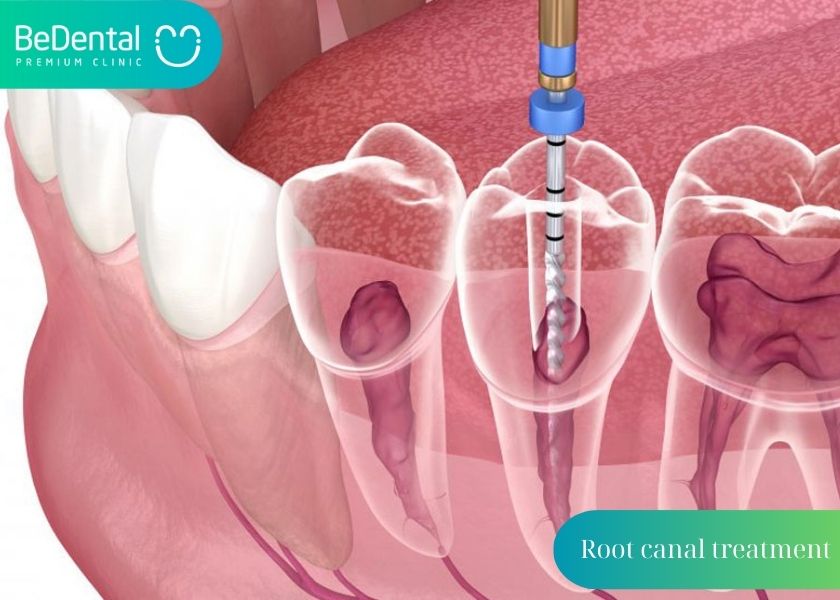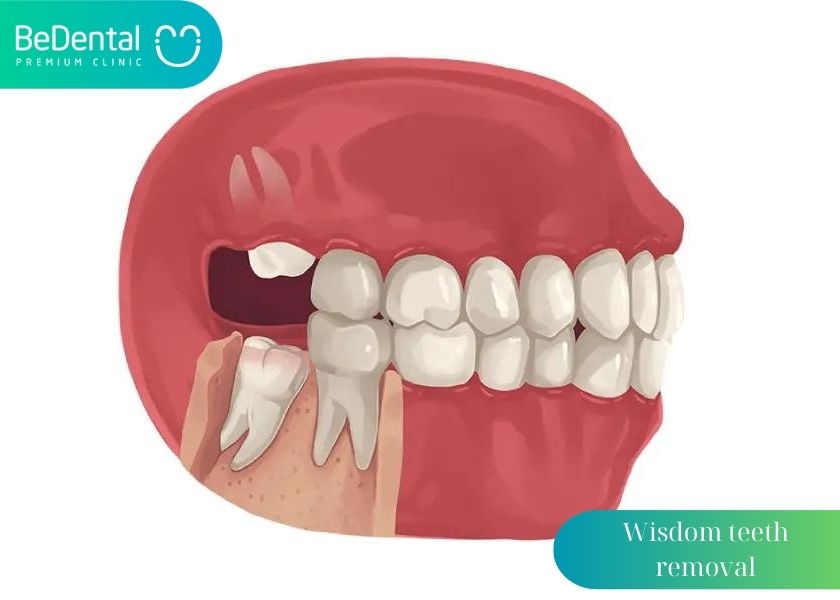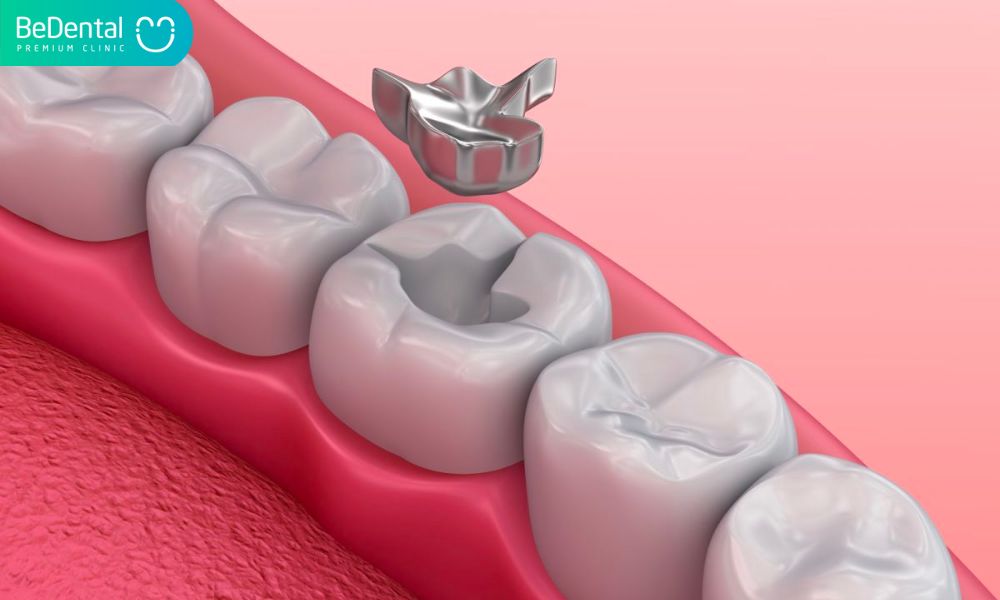Dental Scaling and teeth whitening are methods that help improve the cleanliness of your mouth and remove the condition of yellowing, making your teeth always “as good as new” and boosting your confidence in daily communication. These are also considered two commonly used methods nowadays to improve the condition of discolored teeth.
However, should scaling and teeth whitening be performed at the same time? What should be avoided after scaling ? And should scaling and teeth whitening be done regularly? Let BeDental address these two concerns in this article!
I.What is scaling?
Scaling, also known as dental calculus or tartar, is a hardened and thick layer of mineralized plaque that forms on the surface of teeth, especially around the gum line. Dental calculus is usually yellow or cloudy white in color and is formed by the combination of inorganic compounds like calcium phosphate and calcium carbonate (found in saliva) and soft deposits of leftover food, dead cells, bacteria, and precipitated serum.
If left untreated, dental calculus can flow down to the gums and cause oral problems such as periodontitis and gingivitis.
Typically, in modern dentistry, ultrasonic scalers are used for scaling. These machines generate safe-frequency vibrations combined with thin and small scaler tips to penetrate into the gaps between teeth and remove the hard calcified deposits on the surface of teeth, gum line, and subgingival areas. This ensures a safe and quick procedure that makes your teeth whiter and cleaner than before.
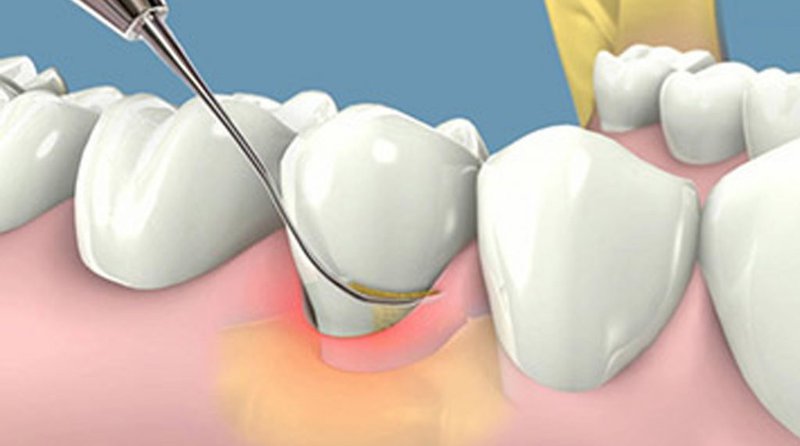
II. Is scaling good? Why should we remove this tough plaque buildup?
2.1. Why should we undergo scaling?
Dental calculus is formed from the accumulation of leftover food, minerals, and becomes an environment for bacteria to attach and thrive. Allowing dental calculus to remain for a long period of time can lead to oral diseases such as gingivitis (causing bleeding gums), periodontitis (resulting in bone loss, toothache, sensitivity, and in severe cases, tooth mobility and tooth loss).
Additionally, harboring hidden bacteria is also a leading cause of conditions like oral mucosa or commonly known as mouth ulcers, throat infections, or tonsillitis, and cardiovascular diseases.
Ways to Prevent Tooth Decay – Why Do You Still Get Cavities Despite Regular Brushing
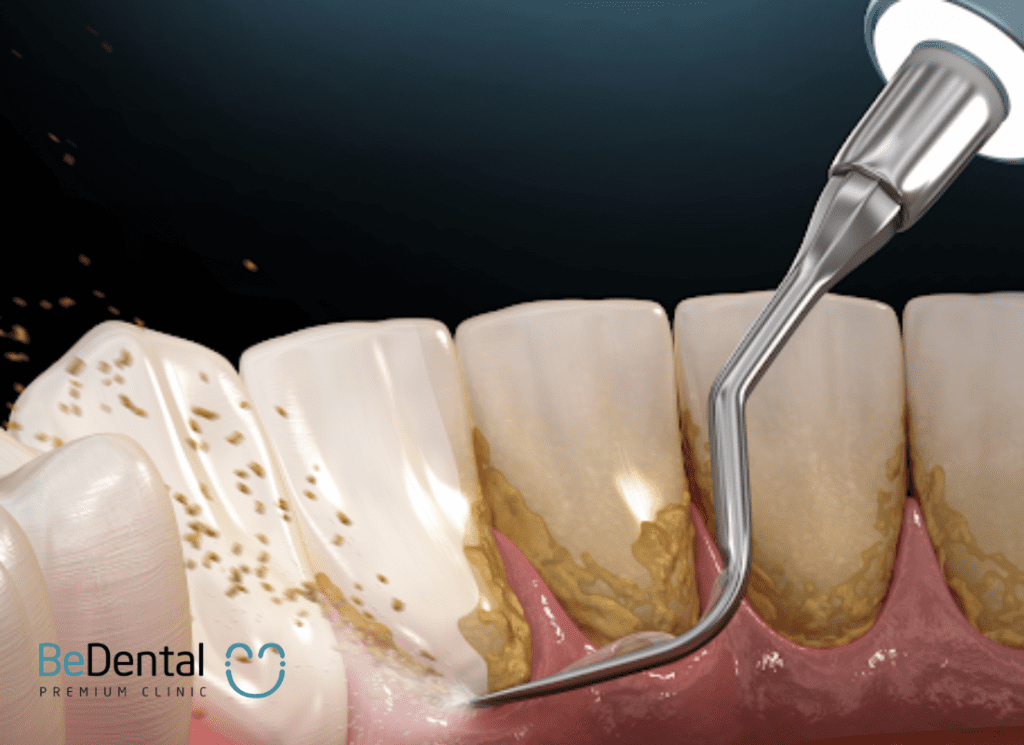
2.2. Reasons why scaling is necessary
Scaling is necessary due to the following reasons:
Dental calculus provides an ideal environment for bacteria to attach and reside. These bacteria produce harmful toxins that lead to inflammation. These infections can eventually result in the process of bone loss around the teeth. Gradual erosion of the bone will cause the gums to recede, making the teeth appear longer and exposing the unprotected areas of the tooth’s structure. This can cause prolonged discomfort and sensitivity for the patient.
Strong and healthy teeth rely on a solid connection between the tooth’s root and the bone. Therefore, if dental calculus continues to spread towards the root area, it can lead to bone loss around the roots, causing the roots to be embedded in the bone and gradually eroded, resulting in shorter and underdeveloped roots. This weakens the connection between the bone and the roots, leading to tooth mobility and tooth loss.
The bone supports and anchors the teeth, ensuring their stability. However, physiological bone loss is inevitable over time. Therefore, regular scaling helps alleviate the pressure on the bone and helps maintain the bone at a stable level.
The formation of dental calculus can cause damage and pose risks to both oral and overall health. Along with the aforementioned reasons, dentists recommend regular dental check-ups every 3-6 months to prevent the buildup of dental calculus, rather than waiting until it has already formed.
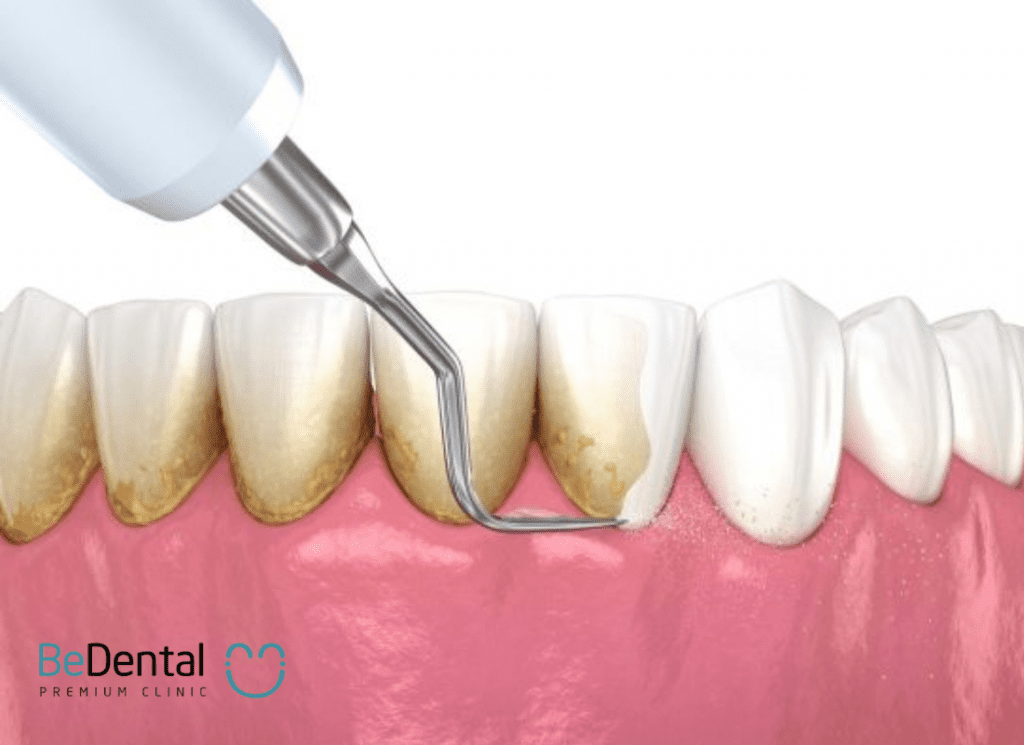
III. Should scaling be done regularly?
Although dental calculus forms every hour, every day, the frequency of scaling depends on each specific case.
Cases where teeth are well cared for and oral hygiene is maintained tend to limit the development of dental calculus, resulting in less frequent scaling. In such cases, scaling can be done every 6 months.
For individuals who smoke, consume stimulants like alcohol, carbonated beverages, excessive sugar, or have poor oral hygiene and rough tooth enamel, dental calculus tends to accumulate more. In these cases, scaling should be done more frequently, around every 3-4 months.
What should you do for a dislocated jaw? Some treatment methods you should know
For children under 10 years old, scaling should be done with the advice of dentists. The scaling process should be performed gently to avoid causing harm to the oral cavity and affecting the oral health of the child.
Regular scaling is a beneficial activity that helps protect the oral health. Scaling is a simple dental service that is painless and does not have any negative effects on soft tissues or tooth enamel if dentists do not directly impact areas such as the tongue or cheeks.
Scaling will also be safe and prevent discomfort if we choose reputable dental facilities equipped with quality and modern facilities to perform the procedure.
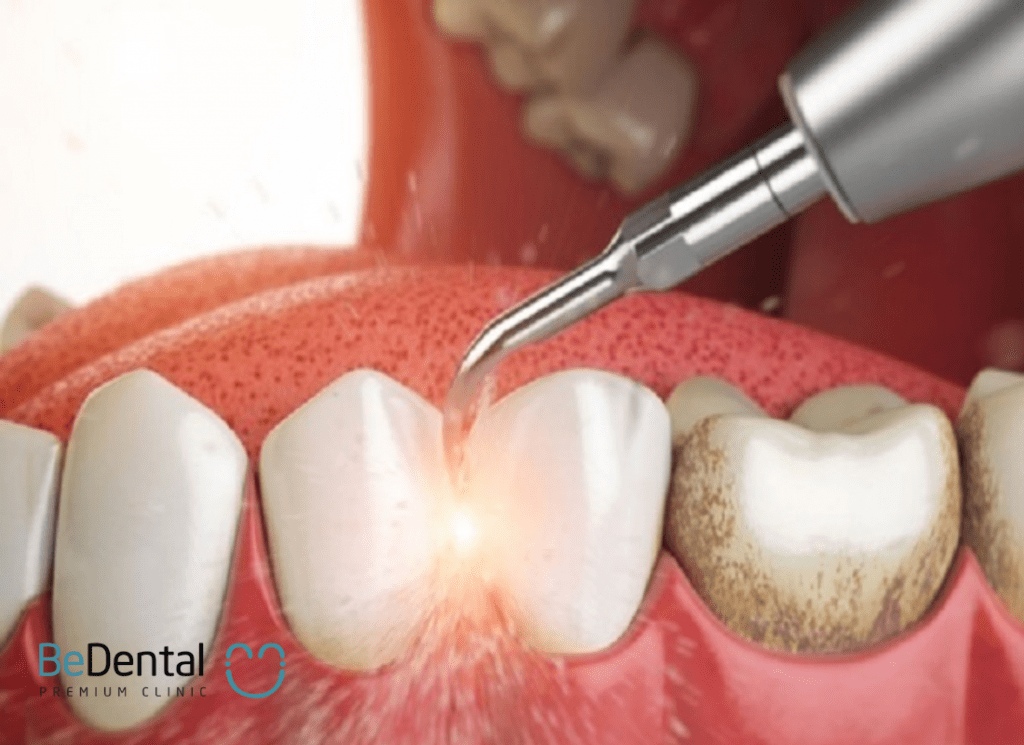
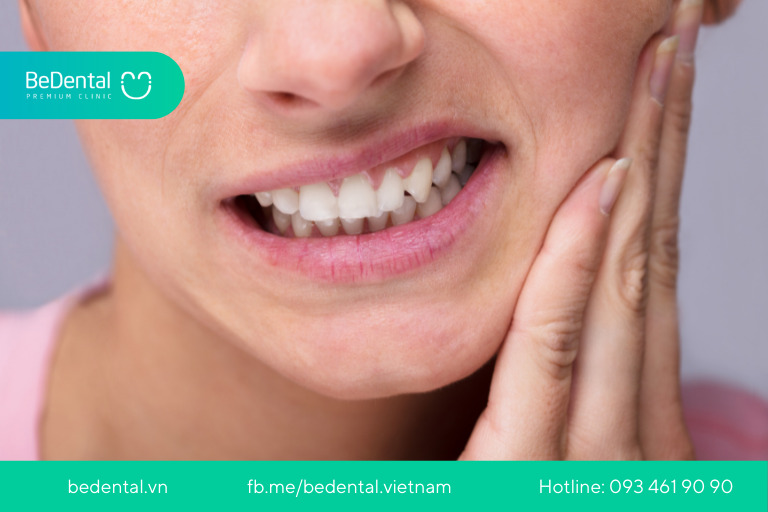
IV. What should be avoided after scaling?
What should be avoided after scaling ? Scaling is beneficial for oral health, so after scaling, do we need to avoid certain foods to protect our teeth? To answer this question, BeDental would like to provide some guidelines for you to follow after scaling:
4.1. Limit consumption of overly hot, cold, or spicy foods that can irritate the teeth
Foods that are too hot, cold, or spicy can cause irritation to your teeth after scaling. After removing dental calculus, your teeth become sensitive because the plaque and enamel have been removed and the enamel has not yet had time to recover and protect your teeth.
In this case, if you consume these types of foods, it can lead to tooth sensitivity, worsen gum health, and even cause tooth decay, fractures, or pulp death. Therefore, after scaling, it is advisable to limit the consumption of foods such as ice cream, ice water, spicy noodles, carbonated drinks, etc.
4.2. Foods with strong acidity
Acidic foods are known to erode tooth enamel and it is recommended to limit their consumption to protect the teeth. Especially after scaling, the enamel is still weak and difficult to protect from irritants, making it more susceptible to acid erosion and tooth damage. Therefore, after scaling, it is best to avoid consuming acidic foods such as oranges, grapefruits, lemons, alcohol, etc., to protect your teeth during this time.
How to Stop Bleeding after Wisdom Tooth Extraction? Some Ways to Control Bleeding
4.3. Limit consumption of sugary foods
Sweet, sugary foods are known to contribute to tooth decay. These foods create an environment for bacteria to thrive in the mouth, which can lead to dental diseases and affect our overall health.
Especially after scaling, consuming too many sweets can quickly lead to the buildup of dental calculus and counteract the effects of scaling. Therefore, after completing scaling, it is recommended to avoid consuming sweet foods or foods high in sugar and starch, such as sweet pastries, carbonated drinks, etc., to limit the growth of bacteria after scaling

4.4. Avoid whitening teeth at home immediately after scaling
After scaling, the tooth enamel and gums are still sensitive and have limited function, so it is not advisable to whiten teeth at home immediately. Typically, teeth whitening products, whether natural or chemical, contain acids that can have a strong impact on the tooth surface. At this time, when the tooth enamel is no longer as protective, using whitening agents can cause tooth sensitivity, strong irritation to the gums, and tooth erosion.
V. What is teeth whitening?
Teeth whitening is the process of removing stains and discoloration on the teeth by using a whitening gel (Hydrogen Peroxide) combined with the use of blue light energy to create an oxidation reaction. This reaction can break down the molecular chains that cause tooth discoloration, making the teeth appear brighter and more evenly colored without impacting other aspects of the teeth.
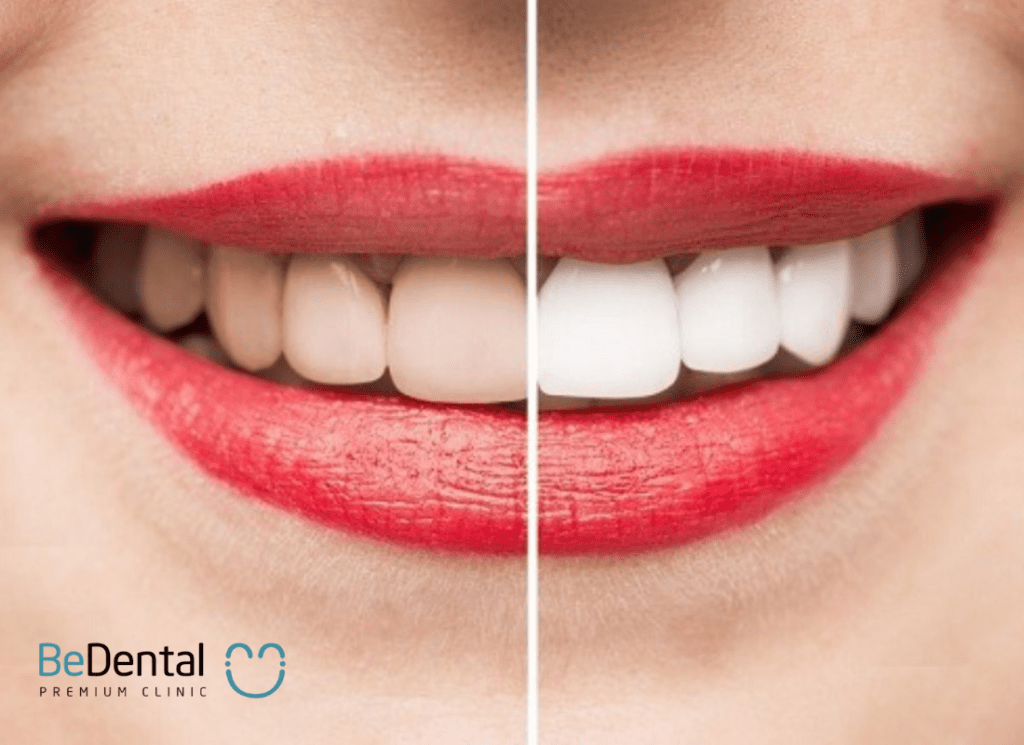
VI. Is teeth whitening good?
Is teeth whitening good? Teeth whitening is a popular dental service in Vietnam that helps whiten teeth safely and protect oral health. Teeth whitening is considered a safe method for oral health as it does not cause any harm to the gums or tooth enamel if done correctly and properly.
To ensure that the teeth whitening process is safe and provides optimal results, it is recommended to choose reputable dental clinics that use good quality, genuine whitening agents and modern whitening light devices.
Teeth whitening can also be done at home, but it is still advisable to consult with a dentist for proper guidance and instructions. Using whitening agents of unknown origin, source, and incorrect concentration can potentially cause serious effects on your teeth, gums, and increase the risk of inflammation.
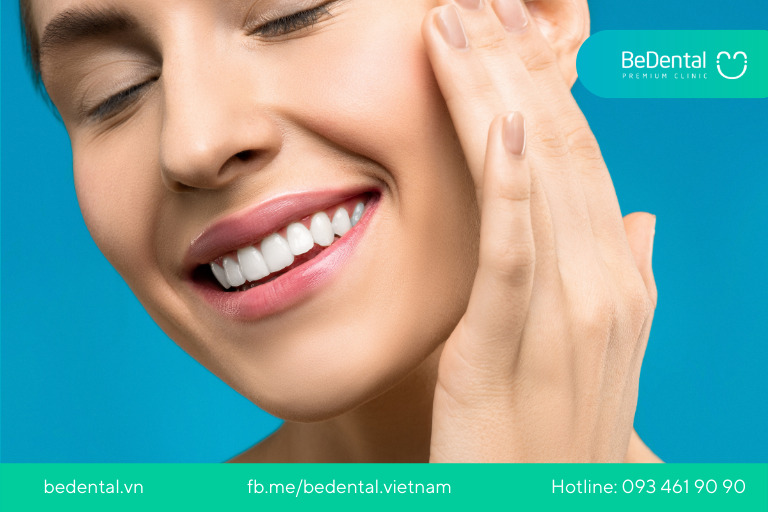
VII. Cases where teeth whitening is recommended and not recommended
7.1. Cases where teeth whitening is recommended
There are several cases where you should consider teeth whitening, including:
- Yellow teeth: Plaque and stains can cause discoloration of the teeth. In this case, teeth whitening can help brighten the teeth and remove stains.
- Aging: Over time, teeth can become dull and lose their vibrant color. Teeth whitening can help whiten the teeth.
- Drug use: Some medications can cause discoloration of your teeth. In this case, teeth whitening can help restore the natural white color of the teeth.
- Chemical use: Using substances that can stain the teeth such as tobacco, coffee, carbonated drinks, etc. Teeth whitening can help remove these agents from the teeth.
- Color issues: Trauma or deformities can cause the teeth to have a different color, such as black or gray. In this case, teeth whitening can help make your teeth more evenly colored.
7.2. Cases where teeth whitening is not recommended
There are some cases where teeth whitening is not recommended, such as:
- Pregnant and breastfeeding women, as some compounds in whitening agents may affect the baby.
- Individuals allergic to any component of the whitening agent.
- Individuals under the age of 16, as gum tissue is still sensitive and easily irritated.
- Patients with oral conditions such as gum inflammation, exposed tooth roots, tooth decay, or enamel erosion.
VIII. Is it advisable to have dental scaling done at the same time as teeth whitening?
Is it advisable to have dental scaling done at the same time as teeth whitening? Although both methods can help make your teeth cleaner and whiter, the decision to perform both services simultaneously depends on the condition of your oral health.
If your gums and teeth are healthy, without inflammation and minimal tartar buildup, it is possible to combine both methods. The dentist will perform a thorough cleaning and then proceed with the teeth whitening immediately after.
If there is a significant amount of tartar buildup on the teeth and it has become hardened, the process of scaling may have a significant impact on the surrounding gum tissue. In cases where there is already a lot of inflammation or infection in the oral cavity, the dentist will perform scaling first and then proceed with teeth whitening once the condition stabilizes.
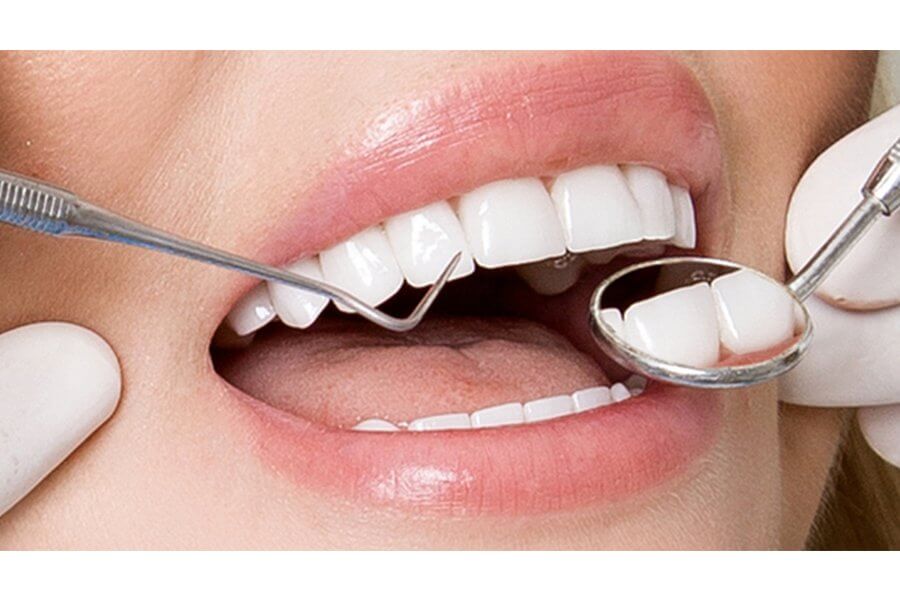
If you have the need for dental scaling and teeth whitening at the same time, please come to see a dentist to discuss this directly. The dentist will conduct a screening examination to get an overall view of your oral and overall health to determine if both services can be performed simultaneously.
Although dental scaling and teeth whitening are simple services provided in dental clinics, the decision on how to proceed with them must be based on each specific case to ensure the safety of our customers. The above are detailed information about dental scaling and teeth whitening that BeDental has provided to you. BeDental thanks you!
Price list for dental scaling:
| Danh mục | Giá thành | ||
|---|---|---|---|
| Lấy cao/vôi răng (Tìm hiểu thêm...) Tartar Cleaning and polishing (More detail...) | |||
| Giá Lấy cao/vôi răng độ 1 Tartar Cleaning and polishing - mild | 350.000 ~ 14$ |
||
| Giá Lấy cao/vôi răng độ 2 Tartar Cleaning and polishing - moderate | 450.000 ~ 18$ |
||
| Giá Lấy cao/vôi răng độ 3 - Tartar Cleaning and polishing - heavy | 600.000 ~ 24$ |
||
| Dịch vụ khác Other dental Service | |||
| Giá Thổi cát cacbonat Cleaning with Cacbonat sand | 1.000.000 ~ 39$ |
||
| Giá Điều trị viêm quanh hàm (bao gồm máng + thuốc bôi) (Tìm hiểu thêm...) Operculectomy - Gumgivitis | 1.500.000 ~ 59$ |
Tư vấn chuyên môn bài viết:
TS.BÁC SĨ NGUYỄN HỮU QUANG
BEDENTAL - TOP STANDARD DENTISTRY SYSTEM
In HANOI
Address 1: 7B Thi Sach St, Ngo Thi Nham, Hai Ba Trung Dist, Ha Noi. - 0934.61.9090
Address 2: 343 Tay Son St, Nga Tu So Ward, Dong Da Dist, Ha Noi. (Nga Tu So Cross) - 0934.61.9090
Address 3: CC2 Tower Nguyen Huu Tho St, Dinh Cong Ward, Hoang Mai Dist, Ha Noi. (Inside True Hope ) - 0934.61.9090
In HO CHI MINH
Address 1: 53 -55 -57 Pho Duc Chinh St, Nguyen Thai Binh, Dist. 1, Ho Chi Minh. - 0766.00.8080
Address2: 25, City Land urban area, Go Vap Dist, Ho Chi Minh - 0766.00.8080
Working: 9am - 6pm everyday
Website: https://bedental.vn/en/
Tẩy trắng răng giá bao nhiêu tiền? 2 nguyên nhân chính gây ra răng xỉn màu



